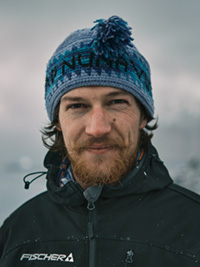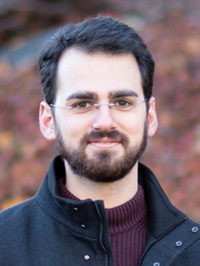Congratulations to Jérémie Bonneau, Anurag Krishna, Amir Hassanpour, and Sina Tavasoli on being recipients of the UBC Four Year Doctoral Fellowship (4YF)
The 4YF program provides UBC’s best research graduate students with financial support, which allows the university to attract and support outstanding students from around the world.
Read on below to learn more about their research:

Jérémie Bonneau
4YF Recipient
Ice-Ocean Interactions in the Canadian High Arctic
Supervisor: Dr. Bernard Laval
An often-overlooked aspect of sea level rise is melting that occurs below the ocean’s surface; rising ocean temperatures are responsible for a significant portion of sea level rise. Water properties and currents of the Arctic and Southern Oceans greatly influence tidewater glaciers and ice shelves. Conversely, tidewater glaciers and ice shelves can have a deep impact on the regional circulation and water properties. Jérémie studies the interactions between these ice structures and the ocean.
Jérémie’s research focuses on fjords and ice shelves of the Canadian High Arctic, which are relatively unstudied compared to their Antarctic and Greenlandic cousins. To measure the ocean, he uses moorings and vertical profilers that measure temperature, salinity, pressure and currents. These measurements are used to get a partial portrait of the hydrography around tidewater glaciers and ice shelves. He then combines these observations with numerical models to get a full portrait and quantify heat, salt and freshwater fluxes around these ice structures.

Anurag Krishna
4YF Recipient
Data Driven Carbon Negative Approach for Automated Robotic Construction to Address Canada’s Housing Supply Challenge and Carbon Neutrality Response
Supervisor: Dr. Nemy Banthia
The Canadian building sector is due for an upgrade. It’s currently overly reliant on carbon, with virtually non-existent use of advanced technologies such as robotics and data analytics. It faces a rapid loss of serviceability. Anurag’s research explores the use of innovative materials and processes that accelerate construction, are more durable against environmental stressors, save cost long-term, and will help meet Canada’s 2050 “Carbon-neutral” promise.
In his research, Anurag explores using 3D concrete printing (3DCP) technology for Canadian climates, which will provide better control and precision, eliminate waste, reduce labor hours, minimize workplace injuries, and expedite construction. Moreover, as the materials will be tested for their printability at nearly 0 degrees Celsius, it will help extend the construction season in the Canadian North. Using data analytics, multiple elements such as time, extrusion rate, printing speed, materials, and space can be handled simultaneously through the use of data-controlled printing algorithms. This will significantly increase the efficiency of the printing system. Using the processes developed, a single-story family demonstration house will be built near Squamish First Nation in Vancouver. The developed technology will be applicable to all geographical regions of Canada.

Amir Hassanpour
4YF Recipient
Human-electric Hybrid Vehicles: Implications of New Non-auto Mobility Options for Street Design and Policy
Supervisor: Dr. Alex Bigazzi
New mobility options such as electric bicycles, e-scooters and e-skateboards create opportunities to address enduring challenges in the transportation sector, such as traffic congestion, air pollution, climate change, public health, energy consumption, and more. At the same time, they present new challenges to urban transport systems where there is already competition for space and access among road users, which can spill over into conflicts. How can we capture the potential benefits of these new travel options, while mitigating the risks of a wider variety of vehicles and services operating within constrained city street spaces?
Amir’s research will address two broad questions: 1) How will new non-auto mobility options (electric bicycles and other no-/low-power vehicles) impact speed dynamics on non-auto facilities and interactions among non-auto travelers? and 2) Given these new non-auto mobility options, what transportation system policies, plans, and designs are needed to mitigate conflicts among non-auto modes?

Sina Tavasoli
4YF Recipient
Rapid Post-Earthquake Regional Seismic Damage Assessment
Supervisor: Dr. Tony Yang
Traditional post-earthquake regional damage assessments rely mostly on human inspection, which is often time-consuming and susceptible to human error—the accuracy of these assessments varies significantly depending on the skill set of the inspector. A typical assessment of a building can takes days. And for assessments of entire regions, up to months. This leads to the loss of precious lives and assets.
Therefore, rapid post-earthquake damage assessment is critical in the early moments after the occurrence of an earthquake in order to provide insight to decision makers for efficient allocation of resources and better dispatching of forces. Sina’s research aims at employing vision-based techniques for real-time automatic scanning of structures to detect and assess all damages in buildings and identifying the post-earthquake structural state. It also aims to provide a more accurate estimate of the expected loss of each building and the possible rate of casualties.
